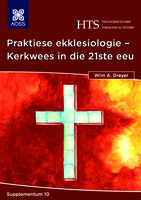Praktiese-ekklesiologie
Kerkwees in die 21ste eeu
| dc.contributor.author | Dreyer, Wim | |
| dc.date.accessioned | 2017-03-08 23:55 | |
| dc.date.accessioned | 2019-04-04 13:38:27 | |
| dc.date.accessioned | 2020-04-01T13:50:14Z | |
| dc.date.available | 2020-04-01T13:50:14Z | |
| dc.date.issued | 2016 | |
| dc.identifier | 625171 | |
| dc.identifier | OCN: 982239379 | en_US |
| dc.identifier.issn | ISSN;0259-9422 (print) | ISSN;2072-8050 (onli | |
| dc.identifier.uri | http://library.oapen.org/handle/20.500.12657/31811 | |
| dc.description.abstract | The book proposes a radical transformation of existing church and training models in South African Reformed ecclesial circles. It takes the theological discussion, especially in ecclesiology, to the next level and argues for new ways to express belief in ecclesial practice. The book provides a provocative strategic vision which takes the ecclesial challenges of the twenty-first century seriously. The book will benefit not only theologians in the academy but also church leaders. Firstly, a situational analysis which focuses on the circumstances and social standing of mainstream churches in the twenty-first century, is done. Current difficulties and obstacles are identified. These can be contributed mainly to the secularisation and post-Christian tendencies of the era subsequent to the two world wars. Secondly, the responsible renewal of and much needed amendments to the structures of South African Protestant faith communities in a postmodern, postliberal, postcolonial context are proposed. The authority of scripture and the creeds of these churches are foundational for sensible renewal. The book dialogues with the relevant existing literature as it develops its ‘missional’ approach to being church in the world today. The investigation is thorough, the argumentation sound and the book makes an original and thought-provoking contribution to the field. The contribution includes biblical perspectives on ecclesial communities, a historical overview of the growth and decline of mainstream churches, insights with regard to the available empirical data, and strategies for the future. The work attests to sound methodology and a strong theoretical foundation. Literature from various parts of the world is utilised, which provides both breadth and depth to the work. The author displays an impressive ability to integrate findings from various fields and disciplines. | |
| dc.language | Afrikaans | |
| dc.relation.ispartofseries | HTS Teologiese Studies/ Theological Studies | |
| dc.subject.classification | thema EDItEUR::Q Philosophy and Religion::QR Religion and beliefs | en_US |
| dc.subject.other | missional ecclesiology | |
| dc.subject.other | models of church | |
| dc.subject.other | missio dei | |
| dc.subject.other | historical-comparative ecclesiology | |
| dc.subject.other | histories-vergelykende ekklesiologie | |
| dc.subject.other | church crisis | |
| dc.subject.other | karl barth | |
| dc.subject.other | transformational leadership | |
| dc.subject.other | kerkmodelle | |
| dc.subject.other | ecclesia semper reformanda | |
| dc.subject.other | kerklike krisis | |
| dc.subject.other | church reformation | |
| dc.subject.other | practical ecclesiology | |
| dc.subject.other | fasiliterende leierskap | |
| dc.subject.other | kerkhervorming | |
| dc.subject.other | missionale ekklesiologie | |
| dc.subject.other | praktiese ekkleesiologie | |
| dc.title | Praktiese-ekklesiologie | |
| dc.title.alternative | Kerkwees in die 21ste eeu | |
| dc.type | book | |
| oapen.abstract.otherlanguage | In die boek word voorgestel dat bestaande kerklike- en opleidingsmodelle in die Suid-Afrikaanse Hervormde ekklesiastiese kringe, ‘n ingrypende transformasie behoort te ondergaan. Dit neem die teologiese debat, veral in die ekklesiologie, tot die volgende vlak, en bepleit nuwe maniere om aan die geloof in kerklike praktyk, uiting te gee. Die boek verskaf ‘n uitdagende strategiese visie wat die kerklike uitdagings van die een-en-twintigste eeu ernstig opneem. Die boek sal nie net vir teoloë in die akademie tot voordeel wees nie, maar ook vir kerkleiers. Eerstens is daar ‘n situasie-ontleding gedoen wat op die omstandighede en die sosiale status van hoofstroomkerke in die een-en-twintigste eeu, gekonsentreer het. Huidige probleme en struikelblokke is geïdentifiseer. Dit kan hoofsaaklik toegeskryf word aan die sekularisasie en na-Christelike tendense van die tydperk na die twee wêreldoorloë. Tweedens word voorgestel dat die vernuwing van en die broodnodige wysigings aan die strukture van die Suid-Afrikaanse Protestantse geloofgemeenskape in ‘n postmoderne, postliberale en postkoloniale verband, op ‘n verantwoordelike manier gedoen word. Die gesag van die Skrif en die geloofsbelydenisse van hierdie kerke is die grondslag vir ‘n sinvolle hernuwing. In die boek word gesprek gevoer met die tersaaklike, bestaande literatuur soos wat dit sy missionale benadering om vandag kerk in die wêreld te wees, ontwikkel. Die ondersoek is deeglik, die bewysvoering is betroubaar en die boek lewer ‘n oorspronklike en gedagteprikkelende bydrae op dié gebied. Die bydrae sluit in Bybelse perspektiewe en dié van kerklike gemeenskappe, ‘n historiese oorsig van die ontwikkeling en agteruitgang van die hoofstroomkerke, insigte met betrekking tot die beskikbare empiriese gegewens en strategieë vir die toekoms. Die werk getuig van ‘n deeglike metodologie en ’n sterk teoretiese grondslag. Literatuur van verskeie dele van die wêreld is gebruik, wat breedte en diepte aan die werk verleen. Die outeur vertoon ‘n indrukwekkende vermoë deur die bevindinge van talryke gebiede te integreer. | |
| oapen.identifier.doi | 10.4102/aosis.2016.pe06 | |
| oapen.relation.isPublishedBy | d7387d49-5f5c-4cd8-8640-ed0a752627b7 | |
| oapen.relation.isFundedBy | a869c2be-5bac-45b6-8178-4777ce39c2c4 | |
| oapen.relation.isbn | 9781928396000 | |
| oapen.imprint | AOSIS | |
| oapen.series.number | Supplementum 10 | |
| oapen.pages | 252 | |
| oapen.place.publication | Durbanville | |
| oapen.identifier.ocn | 982239379 |

